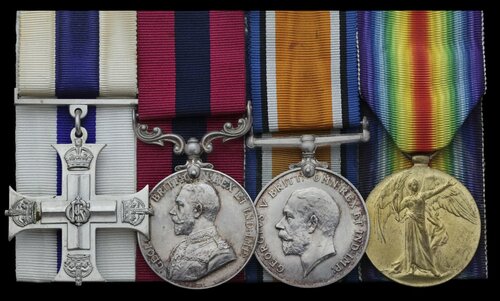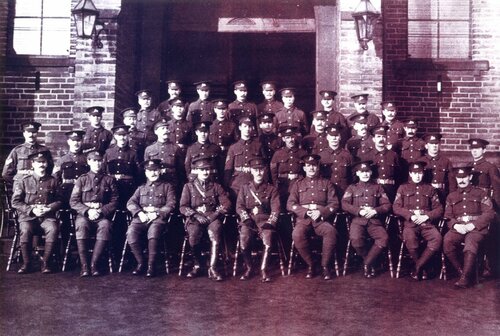Auction: 22001 - Orders, Decorations and Medals
Lot: 388
'Towards nightfall he [Brough] offered with the aid of a few volunteers to go and search the battlefield for wounded. At once a handful of men offered their services and they set out. They had not proceeded far, however, before the Germans sent over a heavy barrage and Sgt.-Major Brough found himself left with only two men. He refused to come back though and ultimately discovered Lieut. Rhodes lying seriously wounded, so at once at great personal risk and ignoring all danger, he and his brave assistants carried him back to safety. This was only one of the rescues that he made with the shells falling thickly round.'
(History of the 2/6th Battalion West Yorkshire Regiment)
The 'Bullecourt and Cambrai' M.C., D.C.M. awarded to Regimental Sergeant-Major A. Brough, 2/6th Battalion, West Yorkshire Regiment, who lead the stretcher bearers during the massacre at Bullecourt and later personally rallied the men and plugged a gap in the line during the Battle of Cambrai
Military Cross, G.V.R., unnamed as issued; Distinguished Conduct Medal, G.V.R. (7840 A.R.S. Mjr: A. Brough. 2/6 W. York:R. - T.F.); British War and Victory Medals (7840 A. W. O. Cl. 1. A. Brough. W. York. R.), minor contact marks, overall very fine (4)
M.C. London Gazette 5 July 1918, the original citation states:
'For conspicuous gallantry and devotion to duty. When almost every officer had become a casualty and the men were disorganised during a counter-attack he went forward from Headquarters without waiting for orders, and after establishing a line, went forward with a small party of bombers up a trench and established a block. He was constantly under heavy fire. When there was hardly and ammunition left he collected a small party and brought forward and distributed six boxes'
D.C.M. London Gazette 16 August 1917, the official citation states:
'For conspicuous gallantry and devotion when acting as a volunteer leader of stretcher bearers. His fearlessness and fine work were most marked'
Albert Brough was born in York in 1884, the son of Robert and Diana Brough of 9 Laythorpe Buildings, Laythorpe. Enlisting with the West Yorkshire Regiment on 10 January 1905 and posted to the Regimental Depot. Further posted to 2nd Battalion on 25 April of that year he was sent to India on 25 October and was appointed Lance Corporal out there on 14 August 1906. Serving with 1st Battalion during the Mohmand Campaign 1908 (Medal and Clasp) he was promoted Corporal that same year on 7 November. Returning to Britain on 30 December 1911 Brough was stationed at Lichfield and promoted Sergeant on 10 January 1912. Transferring to 6th (Territorial Force) Battalion, West Yorkshire Regiment on 1 January 1913 he was appointed Permanent Staff Instructor there.
With the outbreak of the Great War Brough remained with 6th Battalion being appointed Acting Regimental Sergeant-Major on 17 October 1914, later joining 2/6th Battalion. The History of the 2/6th Battalion West Yorkshire Regiment states of his time with them:
'Sergeant-Major Brough [SIC] was on the regular staff of the Territorials when war broke out, and when the I/6th Battalion departed from Bradford, he was left behind to help with the training of the reserve unit and became regimental Sergeant-Major. He was the best type of warrant officer, keen and efficient, and was a tower of strength in those early days, as he did his work so thoroughly and could inspire as well as teach. Nobody who passed through the Battalion will ever forget his sterling qualities'
Promoted to the permanent rank of Company Sergeant-Major while retaining his temporary rank on 1 January 1917 he entering the war in France with this unit the next day. His first act of Gallantry came at the disastrous Battle of Bullencourt where the Battalion suffered appalling losses including all 12 of their Company Officers. Later at Havrincourt Wood, during the Battle of Cambrai he was instrumental in halting a rout among the men of his Battalion and re-establishing a line in the face of enemy fire. As well as his heroics Brough clearly left a lasting impression on his Battalion, as his appearance in a marching song makes clear:
'And we have Sergeant Major Brough,
Shevo, Shevo,
And we have Sergeant Major Brough,
Shevo, Shevo,
And we have Sergeant Major Brough,
As broad as a house and very hot stuff, Shebo, Shevi, etc.'
(IBED)
Unfortunately for this unit was disbanded on 31 January 1918 at Brough was soon posted to 2/7th Battalion. This too was soon to be reduced to cadre and on 16 June 1918 sent back to Britain, the next month on 20 June it was absorbed into the York and Lancaster Regiment. Brough was transferred to 18th Battalion with the regimental number 55607 and joined them in France on 3 July 1918 with the rank of Regimental Sergeant-Major. Tragically at this time Spanish Influenza was ravaging Europe and Brough, as an old soldier, soon caught it. He was soon admitted to 44 Field Ambulance on 13 July 1918. Returning to England for better treatment he was unable to recover and died on 18 February 1919, he is buried at Fulford Cemetery, Yorkshire; sold together with an original copied recommendation and several photographs along with copied research including service records, medical records and London Gazette entries as well as copied photographs, memorial lists and medal lists along with census data and extracts from newspapers and regimental histories.
Subject to 20% VAT on Buyer’s Premium. For more information please view Terms and Conditions for Buyers.
Sold for
£2,500
Starting price
£2100







